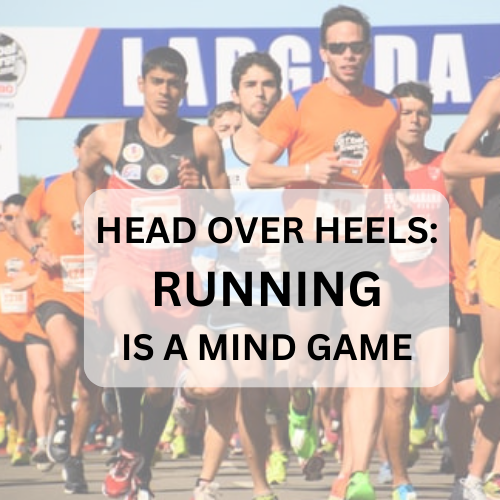A Head over heels moment isn’t it? Literally, as the name suggests, Running is a mind game.
Just like you walk on your heel with your head upright. Yet, head over heels forces you to think as if the person is standing over his head.
Similarly, running is a mind game. we have enough evidence to prove it.
It takes unbelievable discipline, self-motivation and drive to run.
Running is a mind game
Running is a sport that requires both physical and mental strength. While your body endures the physical stress of pounding the pavement, your mind must remain focused, motivated and determined to reach the finish line.
The mental aspect of running is just as important as the physical aspect.
To be successful, you need to have a strong will, a positive attitude and the ability to overcome any challenges that arise during a race.
Running also provides a sense of accomplishment and boosts in self-confidence.
So, next time you lace up your shoes, remember that running is not just a physical workout, it’s a mental game. Stay positive, stay focused and never give up!
Running is a mind game indeed.
The discipline to get up on time. The discipline to pack your shoes. The discipline to eat right. The discipline to rest well. All these factors determine how your train for a run.
Your mind plays the role of a director in your life. It reminds you to have your medicines on time, it reminds you to hydrate well. It reminds you to go to bed early. It reminds you to sit up straight not to slouch while sitting. it’s all in the mind.
Even trained ultra runners fail to run any further if they decide to run half their regular distance. That is because their mind is set on a particular target and once they complete their target they stop.
It’s all in the mind.
Running is a simple game
Running is a simple game. But the discipline which is required for it is set by the mind-body just obeys its order.
As mentioned running is a simple game, but the discipline that goes into pursuing running is managed by the mind.
Running is often referred to as a simple game because it requires no special equipment or skills, just a pair of shoes and the determination to put one foot in front of the other.
The simplicity of running makes it accessible to people of all ages, genders and fitness levels. You can run anywhere, anytime and the only thing you need to focus on is yourself.
Running is also a low-impact form of exercise that provides numerous physical and mental health benefits, making it a simple and effective way to stay active and improve overall well-being.
Whether you’re a seasoned runner or just starting out, running is a simple game that can bring joy, challenge and a sense of accomplishment to your life.
It’s one of the most simple forms of exercise.
You don’t need a gym, or a pool you just need to pack a pair of running shoes along with your luggage.
Rest it all up to you to wake up and run.
The famous reasons for not running
- I have never run in life.
- I am too lazy
- I am too old to start.
- My knee hurts
- I am too busy.
Few side effects of running
We all know if you 5 reasons to not run life gives you 10 reasons to run.
- Improved cardiovascular health: Running can help increase your heart and lung function, reducing the risk of heart disease.
- Better physical fitness: Running can help increase strength, endurance and flexibility, leading to a more toned body.
- Weight loss: Running is an effective way to burn calories and lose weight.
- Stress relief: Running can help release endorphins, which are known to reduce stress and improve mood.
- Better sleep: Running can help regulate sleep patterns and lead to better quality sleep.
- Increased energy levels: Running can help boost energy levels and improve overall physical and mental alertness.
- Improved mental health: Running can help reduce symptoms of anxiety and depression and improve overall well-being.
- Increased self-esteem: Running can provide a sense of accomplishment and boost self-confidence.
Negative side effects of Running:
While running has many positive benefits, it can also have some negative side effects if not done properly. Some of the negative side effects of running include:
- Overuse injuries: Running can put repetitive stress on joints and muscles, leading to injuries such as the runner’s knee, shin splints, and plantar fasciitis.
- Dehydration: Running can cause the body to lose fluids, leading to dehydration if not properly replenished.
- Poor form: Running with poor form can lead to injury and strain on the joints and muscles.
- Overtraining: Overdoing it with running can lead to fatigue, burnout, and decreased performance.
- Mental burnout: Running can become monotonous or too intense, leading to burnout and decreased motivation.
- Reduced immune function: Intense running can temporarily suppress the immune system, making it easier to get sick.
It’s important to listen to your body, warm up properly, maintain good form and vary your training to avoid these negative side effects. Running is a great form of exercise, but it should be done in moderation and with proper preparation.
In conclusion, running can have many positive effects on overall health and well-being, making it an excellent form of exercise for people of all ages and fitness levels.

Striking the right balance:
The extremity of any kind is bad. Striking the right balance while running is essential to maximize the benefits and minimize the negative side effects. The right balance can help you avoid injury, prevent burnout, and improve your overall running performance. Here are some ways to strike the right balance:
- Proper form: Good form can help prevent injury and improve running efficiency. Focus on keeping your body relaxed and avoiding over-striding.
- Gradual progression: Increase your mileage and intensity gradually to avoid overuse injuries and burnout.
- Rest and recovery: Make sure to give your body enough rest and recovery time between runs to prevent injury and fatigue.
- Strength training: Incorporate strength training and cross-training into your routine to build overall strength and reduce the risk of injury.
- Variety: Mix up your routine by incorporating different types of runs, such as intervals or tempo runs, to prevent boredom and improve overall performance.
- Hydration: Stay properly hydrated before, during, and after runs to avoid dehydration and improve performance.
- Mental balance: Running can have both physical and mental benefits, but it’s important to avoid overthinking and focus on the joy of running.
Striking the right balance while running can help you get the most out of your training and lead to improved overall health and well-being.
One word of caution any sport requires proper guidance and technique and discipline. So kindly get a good coach to guide you this would enable you to achieve your fitness and strength goals without any negative impacts.
So what are you waiting for just get up and run.


I’m thoroughly captivated by your keen analysis and excellent writing style. Your expertise shines through in each paragraph. It’s evident that you invest a great deal of effort into delving into your topics, and that effort is well-appreciated. We appreciate your efforts in sharing this valuable knowledge. Keep on enlightening us! https://rochellemaize.com